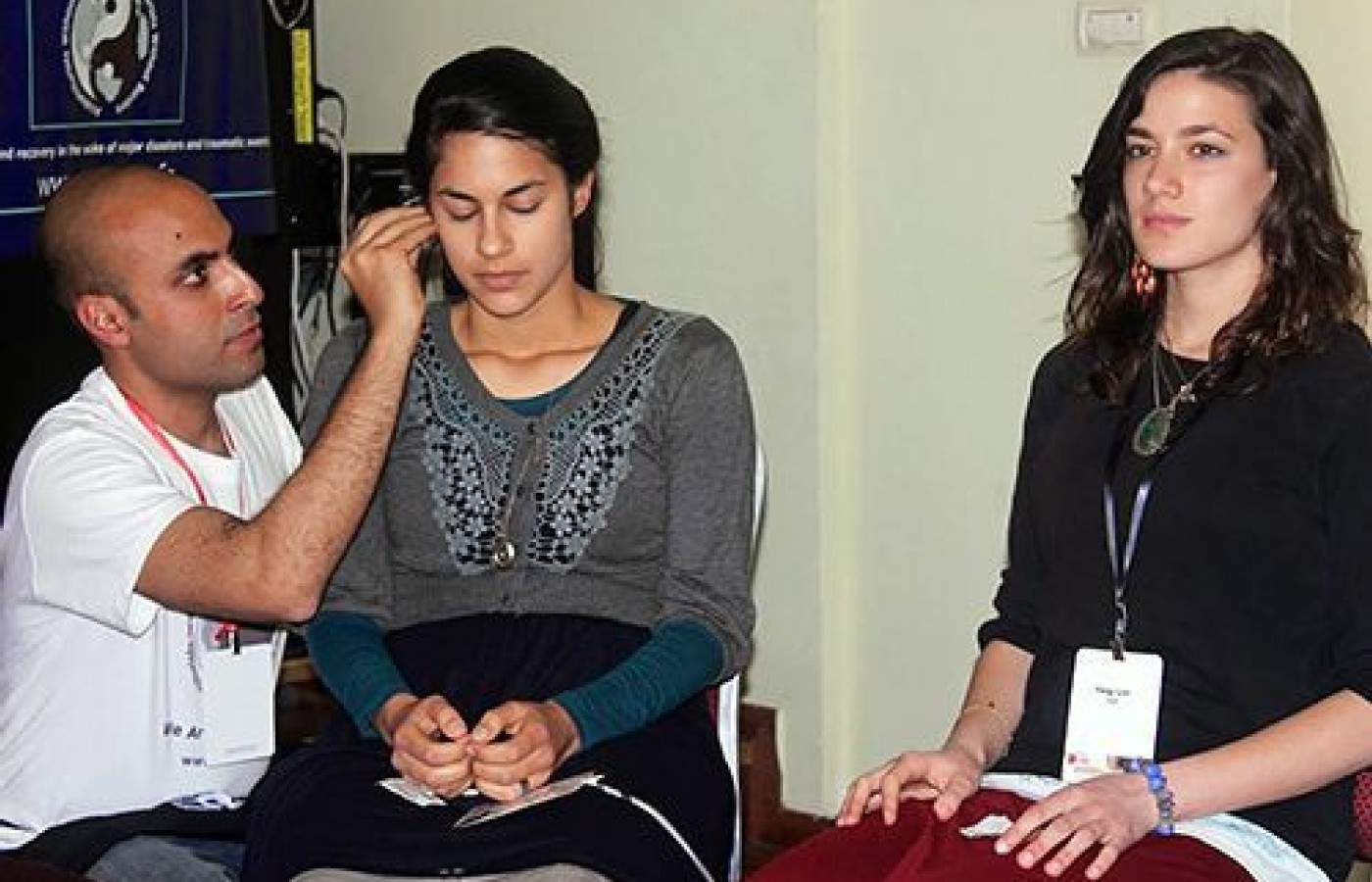One of the longest nerves in the body is known as the vagus nerve (VN). The VN is the 10th pair of cranial nerves that originates at the brain stem in the medulla oblongata. This nerve is part of the parasympathetic nervous system, which is a part of the ANS. Research suggests ear acupuncture can activate the VN.
Healing Community Trauma in Israel and Palestine
It's the beginning of August and Israel and Hamas have just agreed to a 72-hour ceasefire after a month of brutal fighting. In the last four weeks, 1,830 Palestinians and 67 Israelis have been killed. Hamas, the Palestinian Sunni Islamic organization which currently governs Gaza, has shot thousands of rockets into Israel, and the Israeli army has destroyed significant parts of the infrastructure in Gaza. During this war, the third between Hamas and Israel since 2007, there has been very little safe haven for Palestinians and many Israelis have moved between their homes and shelters daily to avoid injury and death from rockets. The cycle of fear, anger, revenge, and retaliation has operated at full pitch, reinforcing traumatic experience and stress for millions of people on both sides of the conflict.
Acupuncturists Without Borders (AWB) trains acupuncturists to provide trauma relief treatment because we believe that unresolved trauma is often at the root of violence, conflict, and war. AWB's mission is to serve ALL people affected by trauma-which means we do not bring religious or political conversations into the "treatment tent" or community clinic, as they tend to be divisive and triggering for many people. Israel is a place where religion, politics, and trauma interconnect in every facet of life, making it hard not to discuss these topics.
Jewish Israelis are impacted by the trauma of multiple wars, terror attacks, the Holocaust, and being driven from their homes in Arab countries, Russia and Ethiopia. Many Israeli soldiers have suffered the "moral injury" of serving in an army that treats Palestinians as enemies. Since 2000, over 1,200 Israeli civilians have been killed in terrorist attacks. The separation barrier was built to stop this. It was not built "justly" in terms of land use and its impact is devastating to the agricultural livelihood of many Palestinians. But most Israelis, of all political persuasions, agree that it has served the purpose of protecting Israel. The barrier is ironic since throughout history Jews have suffered from being contained within ghetto walls. The separation barrier creates a psychological sense for Israelis of being walled in, as much as it keeps Palestinians out.
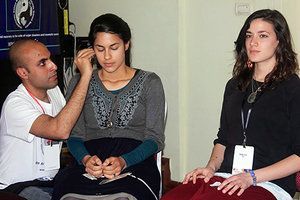
For Palestinians, trauma is part of a generational narrative beginning with Israel's creation in 1948: losing land and homes, living under army occupation, being jailed unjustly, having civilians be killed, living in refugee camps, and facing significant obstacles to economic stability. The barrier wall prevents many farmers from tending the land that has been in their families for generations. Humiliation comes with having to go through security checkpoints to access Palestinian land in the West Bank, which is carved into security areas. About 60 percent of this area is controlled by the Israeli army. The border with Gaza was sealed by Israel after its withdrawal in 2005 and the election of Hamas in 2007. This created devastating economic isolation in punishment for Hamas' political stonewalling. The current war has meant further hardship, as well as deep wounding and even death for thousands of civilians in Gaza.
Traumatic experience, anger, and fear fuel a political unwillingness to compromise and forgive on both sides. While most "ordinary citizens" in Israel and Palestine want peace, their leaders are averse to reconciliation and compromise. So while two peoples share extreme trauma, the possibility of a shared resolution for the future seems remote.
Bringing Healing to a Traumatized Land
In 2012, Israeli acupuncturist Keren Assouline traveled from Tel Aviv to attend an Acupuncturists Without Borders' (AWB) Healing Community Trauma training program in Portland, Oregon. This workshop prepares acupuncturists to provide stress reduction treatment in communities impacted by natural or human-created disasters. Keren came with a clear intention: to learn how to use acupuncture to help people in her country, Jews and Arab-Palestinians alike, who suffer from significant stress and trauma. The AWB training prepared her to set up a clinic using the National Acupuncture Detoxification Association (NADA) protocol, which treats the same five points on each ear to address addictions and/or trauma. Afterwards, she brought her idea to NATAL (The Israel Trauma Institute for Victims of War and Terror), recruited and trained three colleagues, and began providing treatments to NATAL clients in March, 2013 under the name of "Acupuncturists Without Borders Israel."
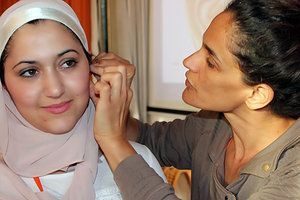
Results of the NATAL-AWB pilot project were very positive. Clients were less anxious and depressed, more focused, and could sleep again. Keren and the AWB Israel team, including Dafna Farber, Oren Rachmany, and Adi Gerlitz, began working with AWB in the United States to bring the Healing Community Trauma course to Israel so that other practitioners could learn how to provide stress reduction acupuncture in their communities. In April of 2014, both of us and AWB trainer Carol Kessler joined with the Israeli team to make the training a reality. During this first trip to the Middle East, AWB provided training to practitioners in Jewish and Arab-Palestinian communities inside Israel. We hope to offer training courses next year in the West Bank and Jordan, where hundreds of thousands of Syrians live in refugee camps.
Here are some excerpts from AWB's Healing Community Trauma blog, which describes the training and how it has helped inspire healing projects throughout Israel, for Jews and Arab-Palestinians alike.
Carla Cassler wrote:
On April 10-12, 2014 the Healing Community Trauma training took place in at Newe Shalom-Wahat Al Salam Oasis of Peace. Created in 1970, this is a very special village where bi-national, bi-religious families live together including Jews married to Muslims, Jews married to Christian Palestinian Arabs, and religious as well as secular families. This may not sound unusual to Americans but in the Middle East, it is a very rare phenomenon. Our training team consisted of four Israeli acupuncturists, three American acupuncturists, a psychologist, and HeartMath trainer. (HeartMath is a simple powerful technique created by the HeartMath Institute that uses breathing and visualization to balance the nervous system and take people out of the fight or flight response that accompanies stress and trauma.)We had worked over 18 months on this project, finally bringing it to fruition.
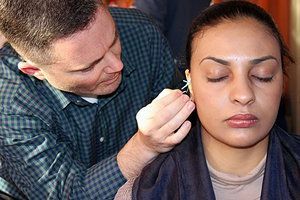
Over three training days, 40 acupuncturists, Shiatsu practitioners, and naturopaths learned the NADA 5-needle protocol for ear treatment. (In Israel acupuncturists aren't licensed, yet most attend four year training programs). Non-acupuncturists learned ear seed treatments with great success. Keren, Adi, and Dafna from AWB Israel taught medical qi gong "healing circles," and how to utilize this approach in community acupuncture settings. We studied reflexology techniques for trauma, talked about social activism and medicine, and shared many personal and professional stories about how trauma impacts Israeli life. We drummed and danced together, ate together, and opened our hearts to one another. While the beginning was a bit awkward (this type of training is a very new thing in Israel, especially one that includes Jews and Arab-Palestinians), we ended our time together with tears, smiles, hugs, inspiration and hope.
Diana Fried wrote:
The training we led with the AWB Israeli team was a phenomenal experience because people soaked it in like it was their own, and became deeply inspired and connected to the work immediately. One person said that she gets caught in her small life, and this training brought her back to her bigger self, expanding her sense of possibility in the world...With AWB trainings we tend to find our kindred spirits wherever we go, but this was over the top. These people are so committed to social change and justice.
Shiran Michaeli, a training participant, wrote about his experience:
My name is Shiran Michaeli. I live in Israel and would like to tell you about the AWB training I attended here...The significance of this training is becoming more and more obvious as time goes by. As you probably know, Israel is a trauma struck place and the people that live here suffer great stress. Living here can make you go quite numb and this numbness that protects us from experiencing very intense negative emotions has its price. Although a big part of my practice is treating patients that suffer from trauma, I don't stop and think or recognize that we all suffer trauma here on a regular basis.
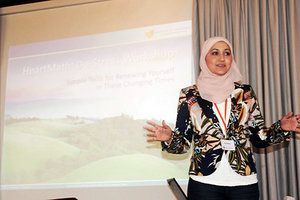
The AWB training made me and many of my colleagues realize it on a very deep level. As the training proceeded, not only was our personal trauma recognized, but we also came to understand how we all carry a collective trauma caused by the stressful life we are forced to lead. I have personally been a witness of many traumatic events such as combat and terrorism. I lost friends and relatives and in addition the news here just won't let you sleep tight...Having someone that's not from here point this out for me created a great impact. My heart opened again towards issues that have begun to feel insignificant...Whether it's anger, fear, anxiety or depression, at a certain point you realize how much it affects you.
As a therapist my life is devoted to helping people overcome the obstacles that make them unhappy. I was looking for some time to find more options to help my patients. The NADA protocol taught by AWB provided me with that solution... This group therapy, which doesn't discuss the trauma but rather allows patients to just be with other patients and receive a simple method of treatment, gives many patients the opportunity to "digest" and heal. Besides the method of treatment, AWB offered us a system and support on how to start taking this practice to our communities. It's one thing to dream about it and another to see someone actually do it. The inspiration we got led to a formation of many healing circles all over Israel.
Emerging Projects
In the words of AWB Israel trainer Adi Gerlitz, "So many things (have) happened here since we last met (at the training)....a lot of wonderful AWB team work in Israel. We really have great people here, highly motivated to reach different populations who suffer physical and emotional traumas. The training we had touched everybody very deeply and changed things...summarizing it all into one word: healing."
Before the AWB training, Shiatsu practitioner Efi Ben-David went regularly to the West Bank on Saturdays with Physicians for Human Rights to provide Shiatsu treatments to local residents. Since the training she now offers ear seed treatments and has brought other training participants like Aya Basheer and Meirav Leicher with her to do this work. Efi also coordinates treatments for men who have walked from Sudan to Israel, who are forced to live in refugee camps without immigrant status near the Egyptian border.
Adi Gerlitz and Meirav Leicher have held clinics with the Arous el-Bahr Organization for Women, an economic empowerment group for Arab-Israeli women in Jaffa. Acupuncturist Maayan Oar-Cohen works with Arab-Palestinian naturopath Aya Jurban to provide treatments in Jisr Al Zarqua, Israel's poorest Arab village. Chava Mahler provides stress treatments in the mental health center in Sderot on the Gazan border, where 30 percent of the population suffers from clinically diagnosed PTSD. Once the war between Israel and Hamas is really over, there will be even more work to do.
For those of us who were together at the AWB training, April seems like a long time ago. Of course, we in the U.S. don't confront the reality of war on our land, so we can't possibly know what it would be like to live in Israel or Gaza. However, we do have a separation wall with our closest neighbor to the south, detention camps for immigrants, and many cities ravaged by drugs, sexual assault, and gun violence. We share a deep need for healing in many of our communities. We are sad, yet inspired. AWB plans to return to Israel and Palestine next year to provide more training and support for local projects. Because of the political challenges between Israelis and their peers in Arab countries, AWB is in a more neutral position to provide training in these areas. We also hope to provide training for field doctors in Jordan who offer care to hundreds of thousands of refugees displaced by the war in Syria.
This work will continue in Israel-Palestine due to the commitment and tenacity of those who seek peace and healing there, even if it is interrupted for the moment. And it will continue here in the U.S. because of the commitment to peace and trauma resolution which so many of you share, and your support of AWB's mission.
Editor's Note: To view the entire AWB Healing Community Trauma in Israel blog and videos, download the Acupuncture Today app at the iTunes store. To contribute to trauma reduction work in Israel-Palestine, please donate at www.acwb.info. Be sure to note that your donation is dedicated to the AWB Israel-Palestine program.
